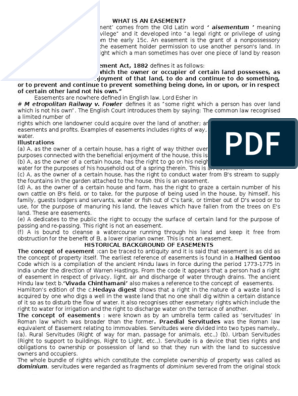Easement rights refer to the legal rights that an individual or entity has to use the property of another for a specific purpose. In India, easement rights are governed by the Indian Easements Act, 1882, which defines the types of easements that can be granted and the procedure for acquiring and terminating them.
There are two main types of easements in India: positive easements and negative easements. Positive easements allow the holder to do something on the property of another, such as the right to pass over someone else's land to access their own property. Negative easements, on the other hand, restrict the owner of the dominant tenement (the property benefiting from the easement) from doing something on their own property that would interfere with the enjoyment of the servient tenement (the property that the easement is imposed upon).
For example, a positive easement might allow a farmer to use a path across their neighbor's land to access their own field, while a negative easement might prevent the neighbor from building a structure that would block the farmer's access to the path.
To be valid, an easement must meet certain requirements. It must be for a specific purpose, such as the right to use a path or a water source. It must also be necessary for the enjoyment of the dominant tenement and not interfere with the reasonable use of the servient tenement.
Easement rights can be acquired in several ways. They can be granted by the owner of the servient tenement, either through a written agreement or by implication, such as through long-term use. They can also be acquired through prescription, which occurs when the holder has openly and continuously used the property for a period of time without the owner's permission.
Easement rights can be terminated in several ways as well. They can be terminated by agreement between the parties, by the destruction of the servient tenement or the dominant tenement, or by the non-use of the easement for a period of time.
In summary, easement rights are legal rights that allow an individual or entity to use the property of another for a specific purpose. They are governed by the Indian Easements Act and can be acquired through agreement, implication, or prescription. They can also be terminated through agreement, destruction of the property, or non-use.
What Is Easement Right In A Property?

The Indian Easement Act says that if a person has enjoyed these over a period of time, they have a valid right without any restriction, almost as though it were a privilege. Here again it is necessary to understand that no damage is substantial unless it materially diminishes the value of the dominant heritage, or interferes materially with physical comfort of the plaintiff, or prevents him from carrying on his accustomed business in the dominant heritage as beneficially as he had done previous to instituting the suit. As the holder of the property he is free to use the servient heritage in any manner he likes, but his acts should not dilute the rights of the dominant owner. The Appellate Court, by an order dated 6th of April, 1999, allowed the appeal partly. The issues framed by the Appellate Court were as follows: 1 Whether the Trial Court was justified in granting a decree for declaration in favour of the plaintiff? LawSikho has created a telegram group for exchanging legal knowledge, referrals, and various opportunities. His acts and deeds should not put the servient owner into inconveniences. The effect of a grant of a right of way differs in this respect from a grant of the soil of the way, for in the latter case the slightest interference is a trespass.
Easement right

Katie Turner is an editor, fact checker, and proofreader. In the case of right to access of light, it does not consist of a right to have a continuance of the same amount of light throughout. Extinction of Easements Section 37 to 47 of the The Indian Easements Act, 1882 , Â provides for the mode of extinction of easements. Or in other words, it can be said that an easement by necessity is an easement that is granted when two parcels are situated such that the nonowners parcel of land is landlocked. It is the intention of the grantor whether he can be presumed to have been intended to convey to the grantee a right of easement for the reasonable and convenient enjoyment of the property which has to be ascertained in all the circumstances of the case to find out whether a grant can be implied. This right is granted because without the existence of this right an occupier or owner cannot fully enjoy his own property. For example, the right of fishery, right to take fruits of the trees in the seasons, etc.






